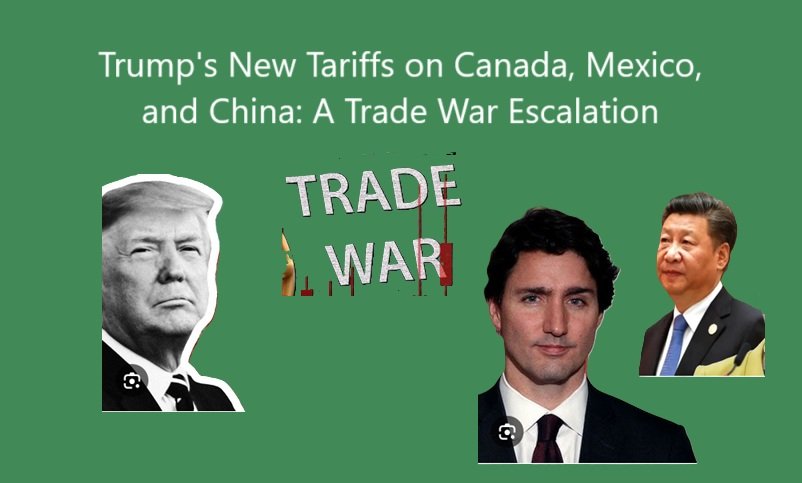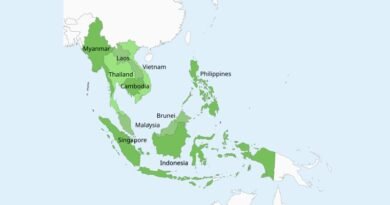Trump’s New Tariffs on Canada, Mexico, and China: A Trade War Escalation
In a dramatic move that has reignited global trade tensions, former U.S. President Donald Trump has imposed significant tariffs on imports from Canada, Mexico, and China. The decision, announced on February 2, 2025, has sent shockwaves through international markets, drawing swift reactions from affected nations and raising concerns about the future of global commerce.
Understanding the Tariffs
The newly imposed tariffs include:
- 25% tariffs on Canadian and Mexican imports
- 10% tariffs on Chinese goods
These tariffs are being justified by Trump’s administration as a means to curb illegal immigration from Mexico, counteract alleged unfair trade practices by China, and address the fentanyl crisis, which has been linked to cross-border trade.
Immediate Global Reactions
The response from affected countries has been swift and severe:
- Canada has condemned the tariffs, stating that they violate existing trade agreements under the USMCA (United States-Mexico-Canada Agreement). Ottawa has threatened to retaliate with tariffs on American goods, including agricultural products and automotive parts.
- Mexico has called the move “unjustified” and warned that it may escalate tensions between the two neighboring countries. Mexico has already outlined potential counter-tariffs on U.S. exports.
- China has gone a step further, calling the tariffs “an act of economic aggression” and vowing to impose “corresponding countermeasures.” Additionally, Beijing has announced that it will file a formal complaint with the World Trade Organization (WTO) to challenge the legality of the tariffs.
Economic Implications: Who Will Be Affected?
The ripple effects of these tariffs are expected to be far-reaching, impacting businesses and consumers across the globe. Some of the key consequences include:
1. Higher Prices for Consumers
Tariffs on imported goods often lead to higher prices for everyday items. Americans could see increased costs for:
- Groceries (especially from Canada and Mexico)
- Electronics and household goods (many imported from China)
- Automobiles (as parts come from all three affected nations)
- Gasoline and raw materials
2. Disruptions to Supply Chains
Manufacturers that rely on international trade to source parts and raw materials will face higher costs. This could lead to layoffs, price hikes, and delayed production in industries such as automobile manufacturing, technology, and retail.
3. Retaliation and Export Losses
As other countries impose counter-tariffs, American exporters will struggle to sell goods abroad. Farmers, in particular, could see a sharp decline in exports, especially of soybeans, beef, and dairy products.
Market Reactions: Volatility Ahead?
Stock markets reacted negatively to the announcement, with the Dow Jones Industrial Average dropping 400 points in early trading. The U.S. dollar weakened slightly against global currencies, and oil prices surged due to uncertainty surrounding supply chains.
Economists are divided on whether these tariffs will achieve Trump’s stated goals. While protectionist policies might boost domestic industries in the short term, they could also hurt long-term economic growth by stifling trade and innovation.
Political Ramifications: A Campaign Strategy?
Trump’s tariff decision comes as he prepares for a potential 2024 election rematch. His supporters view the move as a strong stance against unfair trade practices, while critics argue that it could further isolate the U.S. from its allies and worsen diplomatic ties.
Opponents, including Democratic leaders and international trade experts, have warned that the tariffs could backfire by leading to increased inflation and a decline in American exports.
What Happens Next?
- Canada and Mexico are expected to introduce counter-tariffs in the coming days.
- China may escalate its retaliation by restricting U.S. companies’ access to its market.
- The WTO will likely take months to process China’s complaint, meaning the dispute could drag on indefinitely.
- The Biden administration is expected to weigh in on the issue, possibly attempting to negotiate a diplomatic resolution.
Your Thoughts?
How do you think these tariffs will affect the global economy? Should the U.S. pursue protectionist policies, or should it focus on trade negotiations instead? Share your thoughts in the comments below!
news source: https://economictimes.indiatimes.com/news/international/world-news/donald-trump-imposes-tariffs-on-mexico-canada-and-china-risking-trade-war/articleshow/117846976.cms?from=mdr







